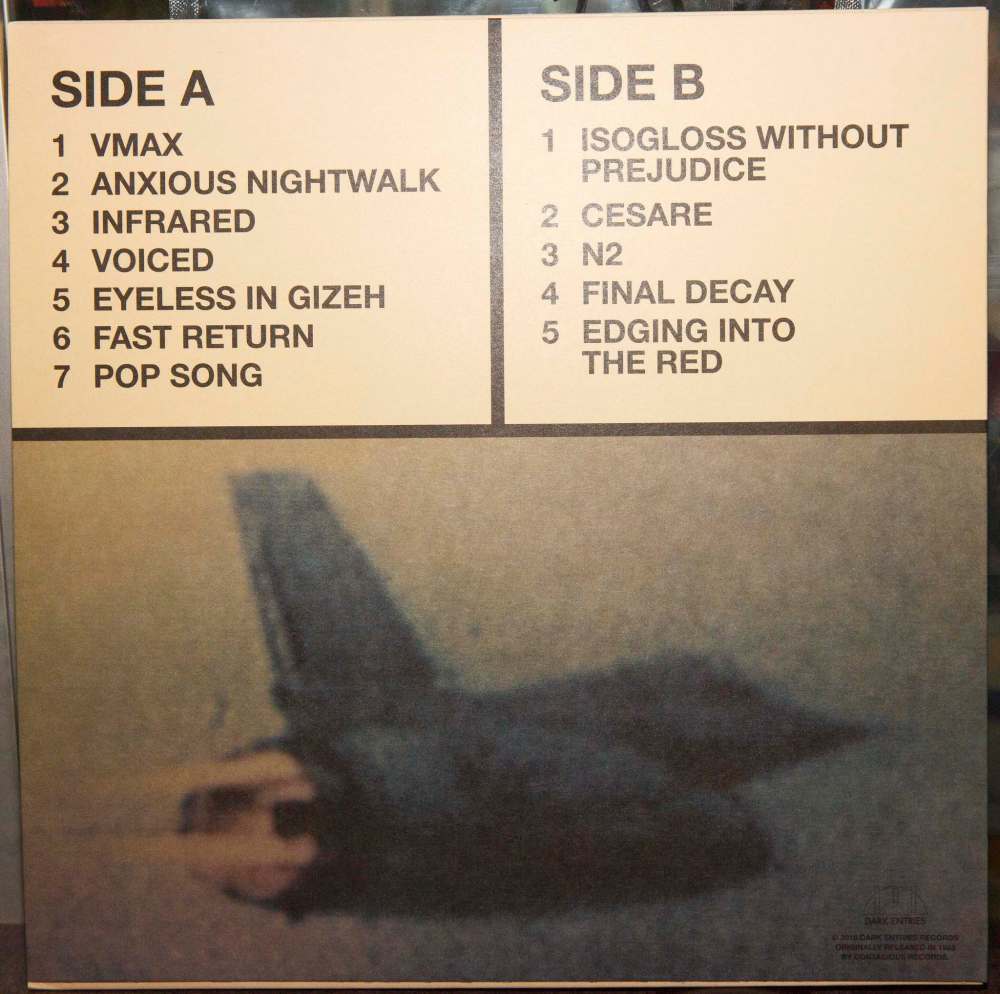Record redux Retired aero-engineer Jon Krocker thought he had left music behind 35 years ago. Now, thanks to California record label Dark Entries Records, Krocker's 1983 cassette-only release, Monolog, is finally having its moment
Read this article for free:
or
Already have an account? Log in here »
To continue reading, please subscribe:
Monthly Digital Subscription
$0 for the first 4 weeks*
- Enjoy unlimited reading on winnipegfreepress.com
- Read the E-Edition, our digital replica newspaper
- Access News Break, our award-winning app
- Play interactive puzzles
*No charge for 4 weeks then price increases to the regular rate of $19.00 plus GST every four weeks. Offer available to new and qualified returning subscribers only. Cancel any time.
Monthly Digital Subscription
$4.75/week*
- Enjoy unlimited reading on winnipegfreepress.com
- Read the E-Edition, our digital replica newspaper
- Access News Break, our award-winning app
- Play interactive puzzles
*Billed as $19 plus GST every four weeks. Cancel any time.
To continue reading, please subscribe:
Add Free Press access to your Brandon Sun subscription for only an additional
$1 for the first 4 weeks*
*Your next subscription payment will increase by $1.00 and you will be charged $16.99 plus GST for four weeks. After four weeks, your payment will increase to $23.99 plus GST every four weeks.
Read unlimited articles for free today:
or
Already have an account? Log in here »
Hey there, time traveller!
This article was published 12/01/2019 (2527 days ago), so information in it may no longer be current.
Hey, hey, my, my, rock and roll can never die.
Sporting a loose-fitting plaid, flannel shirt, sensible footwear and 1950s-style, browline specs, Jon Krocker comes across more as a genteel grandfather-type than an avant-garde, experimental dance music artist whose debut album Monolog was recently released on Dark Entries Records, a San Francisco-based label specializing in “coldwave, synth, Italo and beyond.”
Truth be told, when the soft-spoken sexagenarian begins fumbling with his phone, muttering, “I really don’t understand this Twitter stuff,” or, in very un-rock-n-roll-like fashion, instructs our server that “water will be just fine, thanks” (wait, what, no jello shots?), this writer briefly considers sneaking a peek under the table, to see if anybody’s pulling his leg in regards to this whole dance music thing.
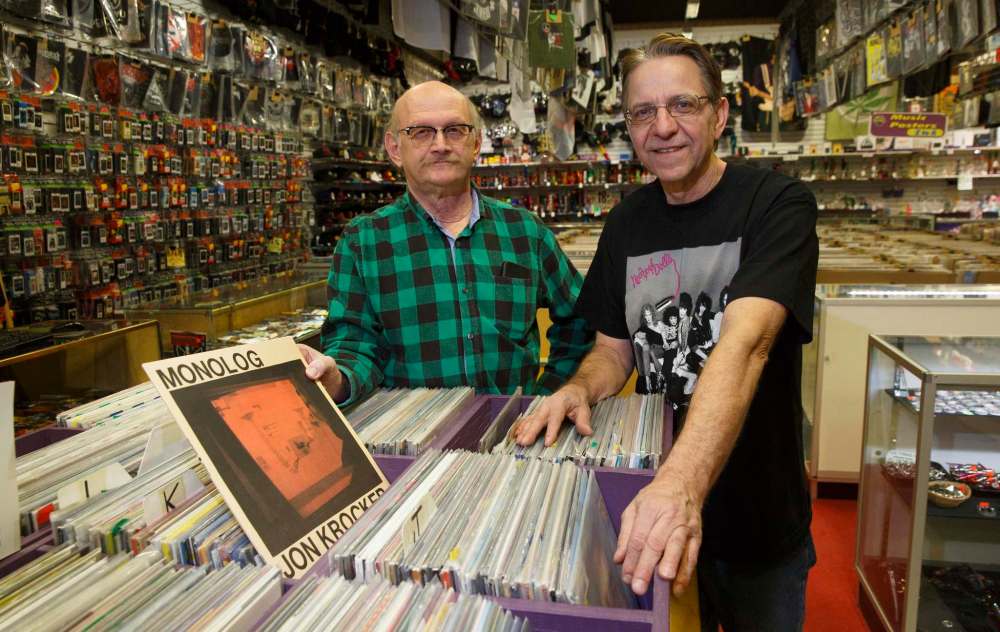
Here’s the catch: the 12 instrumental tracks that comprise Monolog were originally recorded between July 1981 and December 1982, around the same time Krocker — “it rhymes with joker,” he says, we’re guessing, for the bazillionth time — and his childhood chum Victor Shkawrytko were performing as Dialog, a synthesizer-dominated duo heavily influenced by electronic music pioneers such as Kraftwerk and Tangerine Dream.
In September 1983, Monolog came out as a cassette-only release on Contagious Records, a tiny, independent label run by Roman Panchyshsyn, present-day owner of Wild Planet, a pop culture store now located in Osborne Village, steps away from Confusion Corner.
Given the fact only 50 or so copies of Monolog ever sold, imagine its creator’s surprise when Josh Cheon, founder of Dark Entries Records, contacted him to say he was interested in reissuing it on high-quality vinyl, coupled with an in-depth, eight-page booklet and digital download.
“To say the message from Josh came from out of the blue is putting it mildly,” says Krocker, a retired manufacturing engineer who toiled at Boeing Canada for almost four decades, and was instrumental in helping develop that company’s fleet of long-range, twin-engine, 777 liners.
“I had a copy of my old cassette and listened to it every now and again, so it’s not like I’d forgotten about it completely. But to have somebody want to release it — on vinyl no less — after all this time? Yeah, nobody could have seen that coming.”
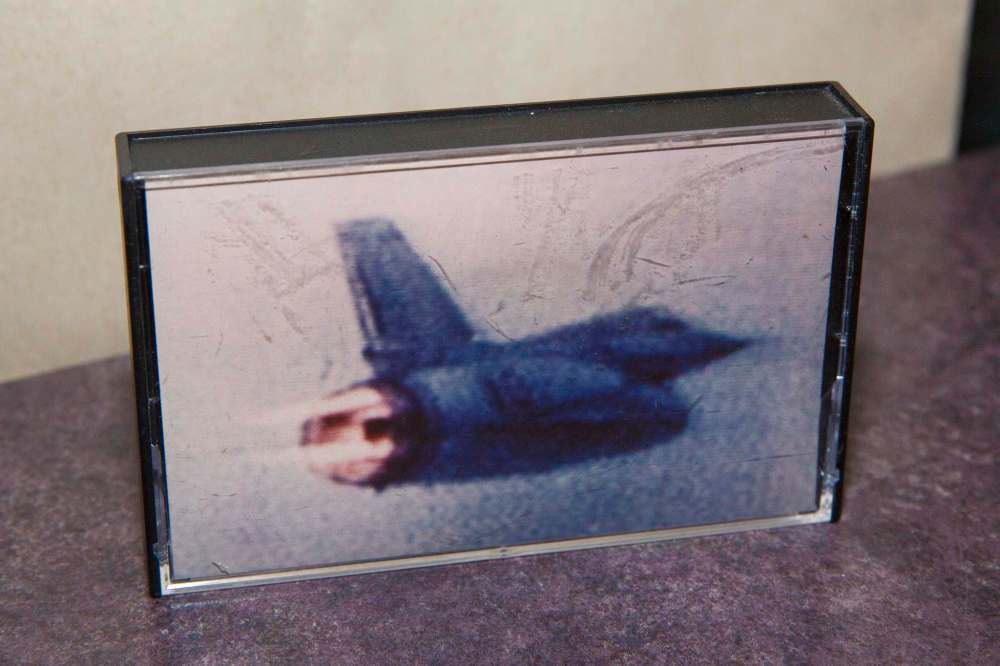
● ● ●
Krocker, 62, grew up in East Kildonan. While his two older brothers were into guitar-heavy acts such as Led Zeppelin and Jimi Hendrix in the latter half of the 1960s, Krocker, a classically-trained organ player, was drawn more to the keyboard-driven riffs of the Doors and Procol Harem.
He vividly recalls hearing Lucky Man, the prog-rock staple by English supergroup Emerson, Lake and Palmer, on the radio for the first time in 1971.
“Initially, I couldn’t stand it. But I gave it another shot and was like, what the heck is that noise in the background?” he says, referring to Keith Emerson’s soaring, Moog synthesizer solo that closes the near-five minute track.
“I wanted to know how they made that sound, what instrument they were using; I remember having so many questions, all of a sudden.”
“I had a copy of my old cassette and listened to it every now and again, so it’s not like I’d forgotten about it completely. But to have somebody want to release it– on vinyl no less — after all this time? Yeah, nobody could have seen that coming.”
A member of Miles Macdonnell Collegiate’s jazz band, Krocker spent much of his spare time the next three years building his own keyboard units. Admittedly, his first few attempts were “pieces of junk.” He kept at it, mind you, and by the time he graduated high school, he and Shkawrytko were landing the odd gig around town, playing what he describes as “totally electronic weird stuff.”
“We weren’t your typical bar band, hell no,” he replies, when asked to describe his combo’s sound.
"Lots of times Victor would start playing, then I’d bounce stuff off him and we’d just keep going for 20 or 30 minutes, building the piece up on the fly until we finally figured a way to get out of it,” he continues, mentioning a particularly memorable performance that occurred at Plug In Gallery (now Plug In Institute of Contemporary Art), a live show that involved a strobe light, disguises and a gas-powered chainsaw. (OK, then.)
In 1981, by which time he had successfully completed Red River College’s aircraft maintenance course and was about to pursue a bachelor of film studies degree at the University of Manitoba, Krocker began renting studio space on a regular basis.
His routine, he says, was to head into the studio once or twice a week after supper, at which point he would proceed to play keyboards “for the next four or five hours, leaving the tape recorder running the entire time, to save whatever it was that came into my brain.”
Having gotten to know Panchyshsyn through his then-downtown record shop, Impulse Records, Krocker figured, “Hey, why not?” when Panchyshsyn proposed releasing some of those recordings, one part Soft Cell, two parts Klaus Schulze, in album form in 1983.
Given the fact Krocker was hired by Boeing soon after the cassette’s release, a career move that effectively ended any long-term musical ambitions he may have entertained, that probably would have been the last the world ever heard of Monolog, if it hadn’t been for a Winnipeg filmmaker named Damien Ferland.
● ● ●
In 2014, Ferland, creator of the autobiographical web series Hyper-Distracted, began tossing around the idea of recreating an experimental short film Krocker made in 1982 called 38 Jansky Units, a three-and-a-half minute work the arthouse cinema website www.mubi.com describes as an “early, new wave classic.”
“Winnipeg is well-known for its bizarre film-making and 38 Jansky Units is a beautiful example of that,” says Ferland when reached by phone. “I talked about my idea to redo it with my friend Dane Goulet, who used to work at Into the Music. He told me that besides the film, Jon had put out an album, too. I was like, ‘Huh? I need to hear this!’”
It turned out Into the Music had a used copy of Monolog, which Ferland was only too happy to purchase. After taking it home and giving it a whirl, he told himself there had to be a label somewhere that would be interested in re-releasing it.
On Oct. 17, 2014, Ferland fired off an email to Dark Entries Records that read, in part, “I should send you guys a digital copy of a tape by Jon Krocker. It’s called Monolog. It’s pretty hypnotic.”
A few weeks later, Dark Entries’ owner contacted Krocker directly, inquiring about master tapes, photos and liner notes; anything, pretty much, associated with his original, decades-old project.
One thing led to another and in September 2018, a package arrived in Krocker’s mailbox, the contents of which included five, shrink-wrapped copies of his “new” album, Monolog.
“I promptly fainted. I mean, what more can I tell you?” says Krocker, who didn’t own a turntable when the records arrived and actually spent a few minutes at a big-box store later that afternoon, debating whether he wanted to drop $200 on a record player or not. (“Jon!” shouts a reporter, leaning across the table. “This is your fricking debut album on vinyl! Who cares if you have to spend $200… $300… $1,000, for pity’s sake!”)
“That night, sitting back and hearing it again, I was just… amazed,” Krocker goes on, grinning from ear to ear.
“Sure, there were a couple cuts where I was a bit like, ugh, I can hear my mistakes. But overall? If I had to redo it again, I probably wouldn’t change much, if anything. Obviously I’m biased but if you’re asking for my critique it would be fabulous… so great.”
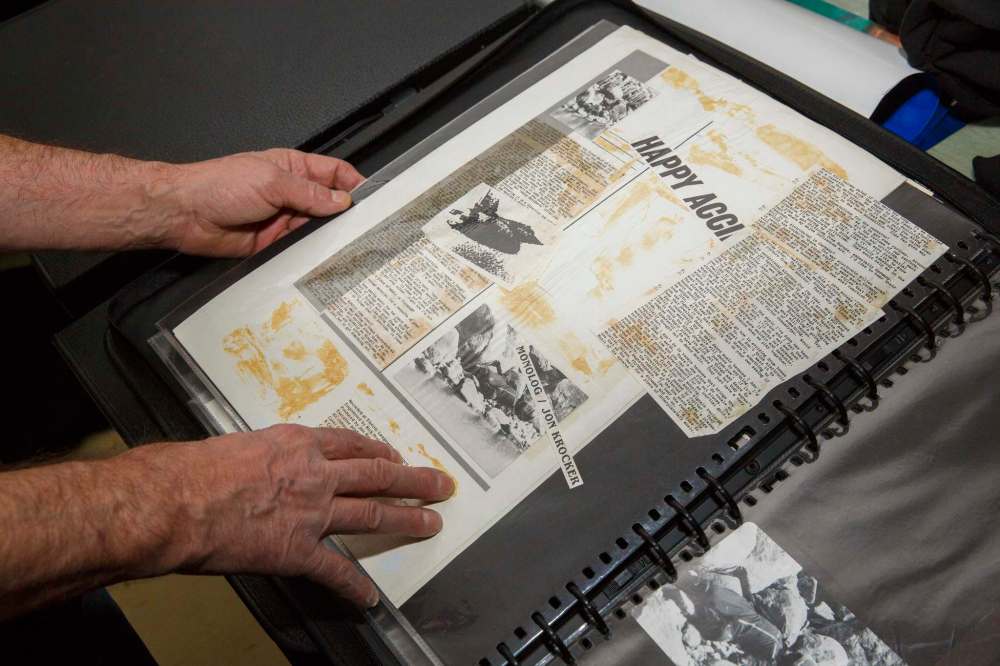
When pressed about his plans going forward — “Howzabout a Monolog album release party? Maybe a Q&A at the Park Theatre?” — Krocker admits putting needle-to-vinyl has definitely rekindled his interest in music.
“It’s funny because at this stage in my life, I’m actually able to afford the kind of gear I always wanted to own when I was in my 20s. So yeah, making more music is something I’d like to do, for sure,” he says, polishing off his last piece of pizza.
And although Krocker won’t see a cent from new sales of Monolog — all rights now belong to Cheon (for further information go to www.jonkrocker.bandcamp.com) — that’s beside the point, he says.
“For me the most amazing thing is that I have a record and it’s out there and people are listening to music I made almost 40 years ago.”
“For me the most amazing thing is that I have a record and it’s out there and people are listening to music I made almost 40 years ago,” he continues, adding his one regret is Gloe Cormie, his partner for 32 years and the person to whom the vinyl version of Monolog is dedicated, didn’t live long enough to see its release.
“She was a writer and poet in her own right and it absolutely tore me to pieces when she passed away in 2015. No doubt about it, she would have gotten a bigger kick out of this than anyone else.”
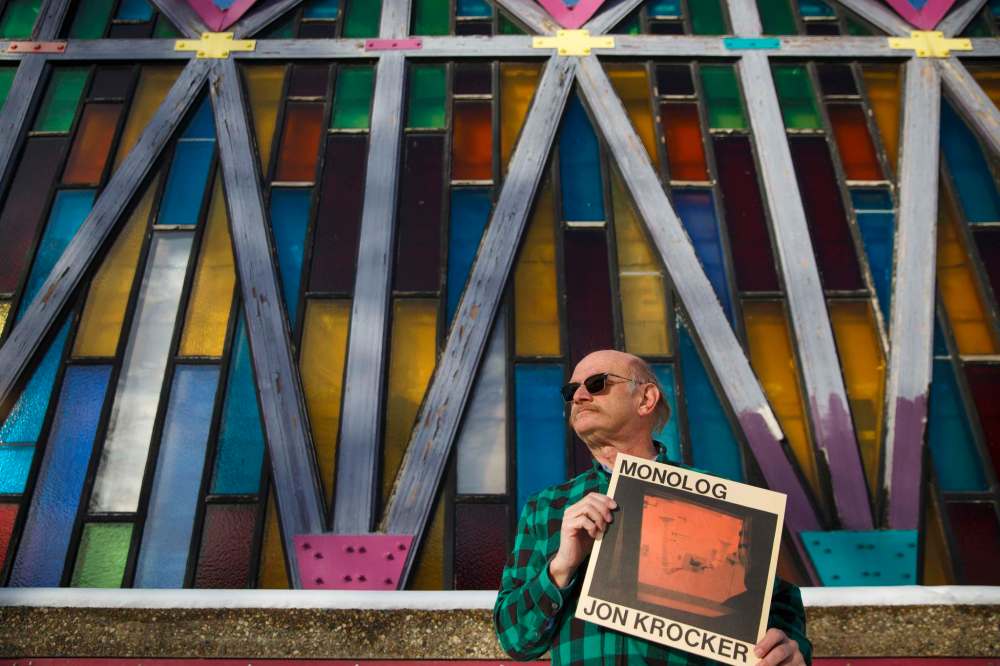
david.sanderson@freepress.mb.ca
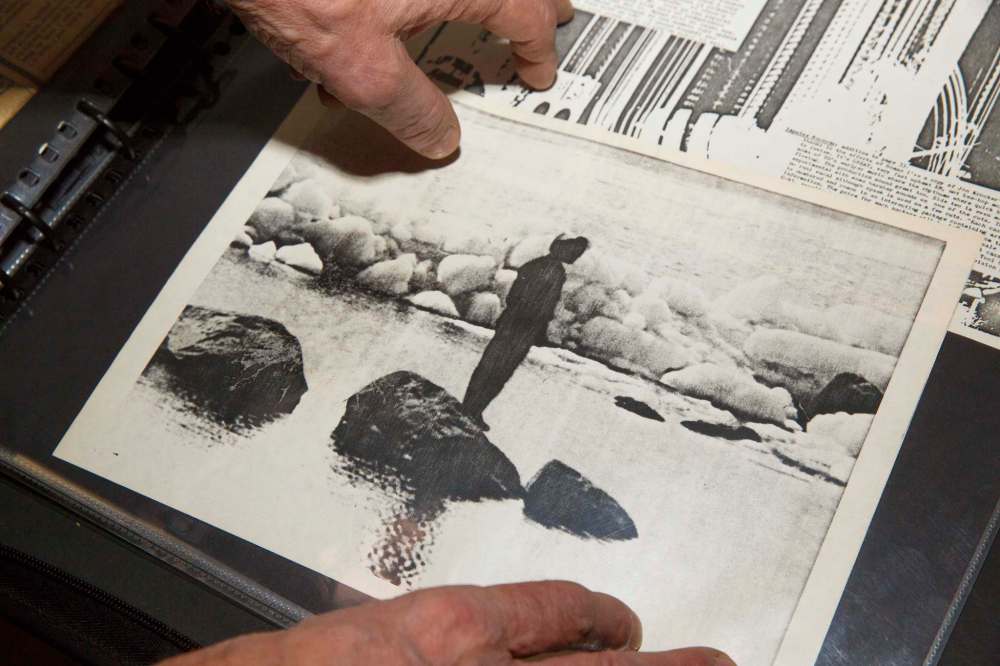
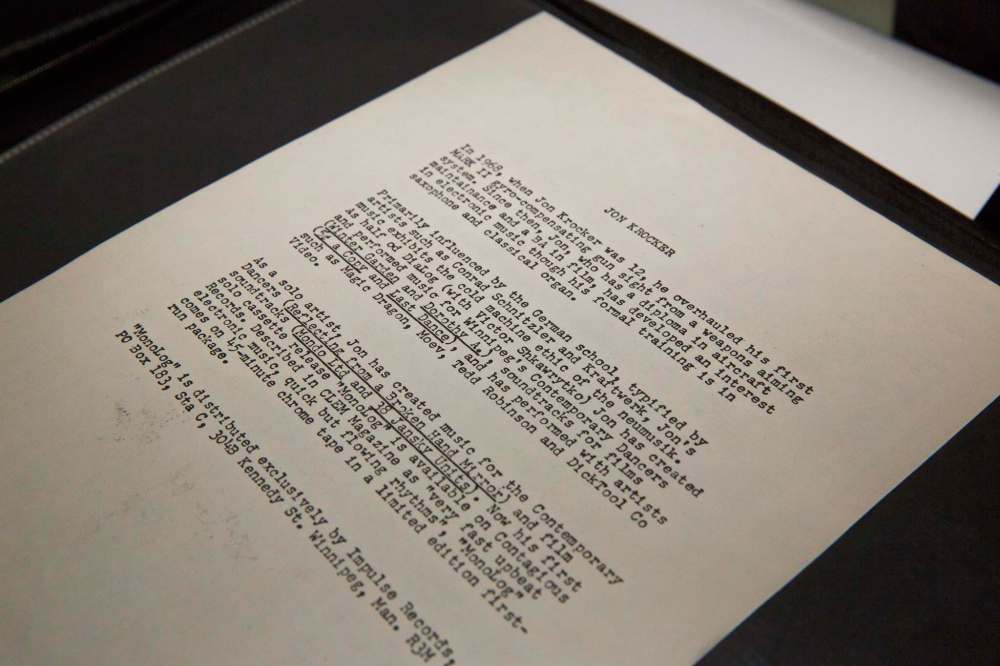
Dave Sanderson was born in Regina but please, don’t hold that against him.
Our newsroom depends on a growing audience of readers to power our journalism. If you are not a paid reader, please consider becoming a subscriber.
Our newsroom depends on its audience of readers to power our journalism. Thank you for your support.

